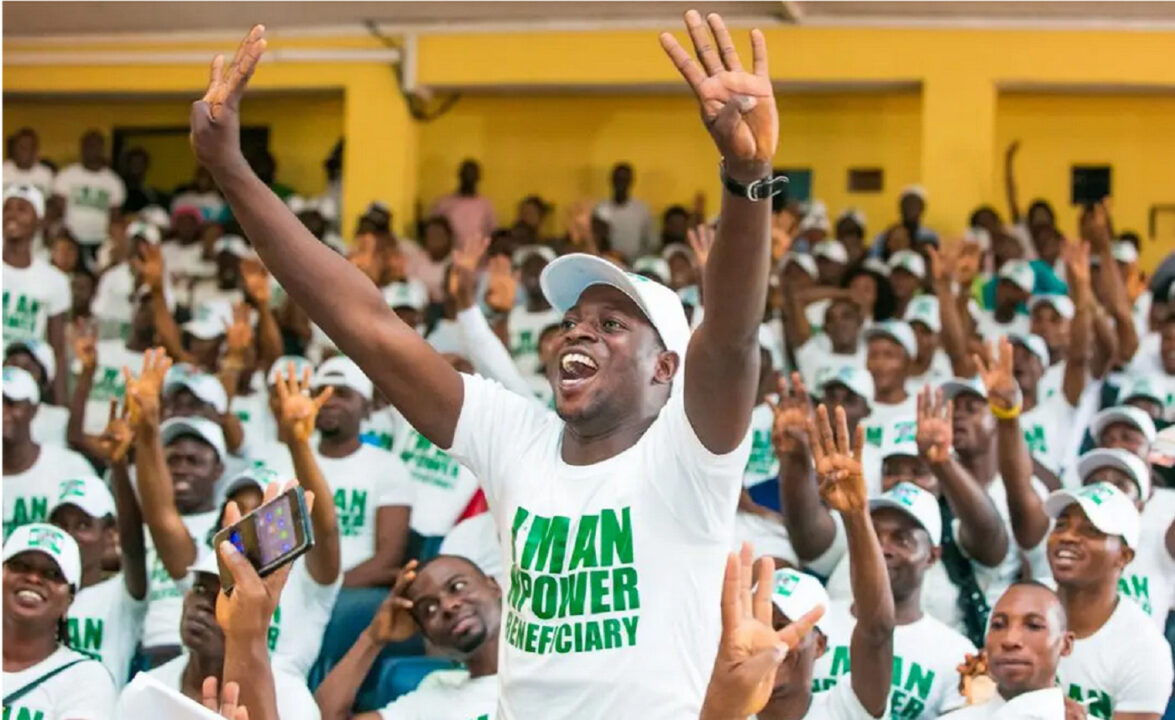When the Ministry of Humanitarian Affairs, Disaster Management and Social Development, FMHADMSD, was created by President Muhammadu Buhari in 2019, he charged the pioneer Minister, Hajiya Sadiya Umar Farouq, to rescue Nigerians from poverty.
Earlier in 2016, the Buhari administration created the National Social Investment Programmes, NSIP, which was overseen by the office of the Vice-President, until the creation of the FMHADMSA in 2019, which then took over the NSIP.
The ministry began overseeing the numerous intervention programmes with regards to tackling poverty, unemployment and insecurity through job creation.
This was to culminate with the lifting of projected 100 million Nigerians out of poverty over the next 10 years.
One of the cardinal points of NSIP is the N-Power programme whose focal point are young people, especially school leavers, non-graduates and school graduates between the ages of 18-35.
Under N-Power, graduates are expected to earn N30, 000; N10, 000 for non-graduates as monthly stipends from the Federal Government until they are exited the programme or secure permanent employments.
It has three core segments, namely N-Power Volunteer Corps (for graduates), N-Power Build (for non-graduates) and N-Power Knowledge, which is also a non-graduate programme for the ICT-inclined.
Being an all-inclusive programme, N-Power focuses primarily on unemployed Nigerian youths with the aim of developing their employability, entrepreneurship skills and capacity to lift them out poverty.
Since its inception the federal government has channeled a lot of human and material resources to enable it deliver on its targets.
One of the beneficiaries of N-Power Knowledge Programme, Mr Umar Ahmed Sarki, said that the programme was of immense benefit to youths.
“The N-Power programme is a good one. We thank the government for empowering the youths with monthly stipends. We hope it will be sustained by the incoming administration’’, Sarki said.
Similarly, Abigail Thomas who benefited from the same programme said she would use the knowledge gained from the training on software engineering to develop applications that would help in solving some of the challenges facing humanity.
“I have been here since February. It has been an amazing experience as we were paid transportation fare to get here and we get paid N1, 200 for daily feeding.
“We have been taught Javascript, how to build websites and other programmes. I thank God and the Ministry of Humanitarian Affairs for this wonderful opportunity, and will definitely implement what I’ve learnt at the end of the training.
“The Federal Government should please sustain the programmes to give opportunities to other youths to benefit. This way, the vision of Buhari to lift 100 million Nigerians out of poverty in ten years will be achieved,’’ Ms Thomas said.
A beneficiary of N-Creative, Ngusha Elijah, said he would venture into the entertainment industry after learning how to write scripts for TV production.
“Since resuming on Feb.15, I’ve learnt a lot on how to generate interesting story ideas, write stories and create interesting contents.
“The Federal Government has done its best to ensure that unemployed youths are empowered. It will be highly appreciated if the incoming administration will sustain the N-Power programme.
“The program has helped a lot of people. There are some people out there who have never earned N30, 000 before, but the N-Power program has helped their lives. It is a step in the right direction to alleviate poverty.
“Even my younger sister is a beneficiary, so I can cite her as an example of how the N-Power programme has been to Nigerians and should be sustained’,’’ Mr Elijah said.
Another beneficiary, Mr Akighir Aondohemba, from Benue, said he would use knowledge gained from the training to build websites for business owners and create wealth for himself and his families.
“I want to appeal that the Federal Government should ensure that this kind of programme continues so that other Nigerians can benefit from it.
“The target audience should be people like me; people who are based in the rural and semi-urban areas of Nigeria.
“With my knowledge, especially in using WordPress, I feel I can now build websites at affordable prices so that business owners living in rural areas will have websites.
“So I’m encouraging the Federal Government to continue with this programme,” Aondohemba said.
Experts say that successful application of skills learnt is imperative in measuring the outcome of any training programme and a facilitator on N-Creative (script writing), Marvelous Abutu, said the beneficiaries are well equipped in that regard.
The Programme Manager on Software Training Temitope Folorunsho, shares that same optimism.
“We teach them web design, graphics and basic ICT knowledge. So, my expectation is that they should learn this as if their lives depend on it.
“There is the need for the programme to be sustain by the next administration, because the impact is enormous”, Folorunsho said.
However, critics had alleged that the N-Power programme is shrouded with corruption and several forms of malpractices, allegations the supervising minister has denied.
“The ministry has deployed a well-rounded mechanism for selection of eligible beneficiaries from across the country; this has been in place since the inception of the programme.
“Working with our service provider, program beneficiaries are boarded, trained and deployed to pre-selected places of primary assignment.
“When it came to our notice that there may have been sharp practices by some personnel of the Payment Service Provider (PSP) involved in the payment processes of beneficiaries, the matter was immediately referred to ICPC,” she said.
In spite of the shortcomings, experts say the programme has been a major contribution by Buhari administration to fight youth unemployment and stimulate poverty alleviation.
Observers, therefore urge the incoming administration to consider the possibility of retaining the programme and making amendments to take care of identified lapses.














